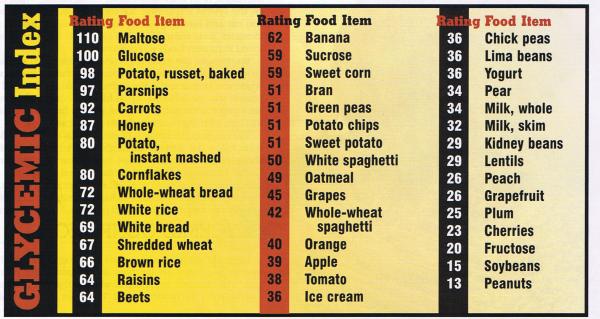Let
Acg67
Posts: 12,142 Member

You see a lot of threads around the forum like white rice vs brown rice, whole wheat vs white pasta, "good carbs" vs "bad carbs". And inevitably someone will bring up one product having a lower GI, so it is better for you and particularly for weight loss. So let's take a look at the GI index and mostly how it pertains to weight loss. A lot of this info came from Alan Aragon's article here; http://www.alanaragon.com/elements-challenging-the-validity-of-the-glycemic-index.html. I added in some basic info on the GI index , added some more studies and added a few other little things as well.
1. First what exactly is the GI index?
The GI index was invented by Dr. David Jenkins in 1981 to help diabetics manage their blood sugar levels. It is calculated by testing a isocaloric amount of carbohydrate on a fasted subjects and measuring the blood glucose AUC for the subjects. It is then divided by the standard (generally glucose which has a GI rating of 100) and multiplied by 100. The ratings are supposed to signify the rate at which the food releases sugar into the system and how quickly it is digested. The faster the food is digested or absorbed, the faster it releases glucose leading to a spike in glucose level in the blood. Although interestingly enough, it is possible that a lower GI means the quicker removal of glucose not it's appearance, see;
Schenk S et. al. Different glycemic indexes of breakfast cereals are not due to glucose entry into blood but to glucose removal by tissue. Am J Clin Nutr. (2003) 78(4):742-8.
http://www.ajcn.org/content/78/4/742.full.pdf
Also another thing to keep in mind, numerous factors can alter or effect a food's GI, such as; If you are fasted or not, how you cook the food, if the food is combined with other foods etc etc.
2. What about insulin, doesn't a low GI mean it will produce a lower insulin spike?
Without getting into why most people don't have to worry about foods that spike their insulin, the answer is, while the GI index and the insulin response to said foods correlate relatively well that is not always the case. See;
Holt et al. An insulin index of foods: the insulin demand generated by 1000-kJ portions of common foods. American Journal of Clinical Nutrition, Vol 66, 1264-1276
http://www.ajcn.org/content/66/5/1264.full.pdf+html (Pay attention to Table 4)
Östman et al. Inconsistency between glycemic and insulinemic responses to regular and fermented milk products. American Journal of Clinical Nutrition, Vol. 74, No. 1, 96-100, July 2001
http://www.ajcn.org/content/74/1/96.full
3. So talk to me about weight loss. Every diet guru says to eat low GI foods for weight loss.
The rationale for so called gurus recommending low GI foods for weight loss varies from increased satiety to more stable blood sugar throughout the day to preventing insulin spikes. However if we look at the studies testing high GI vs low GI, we see that many find no difference in weight loss. Also many of the studies, esp the shorter term ones are set up as an all high GI vs all low GI diet, which doesn't reflect your avg person's diet who eats both high and low GI foods. And in those studies we still find that weight loss isn't always greater in the all low GI diet. Below are some of the studies supporting that low vs high GI foods don't make a difference in weight loss.
An 18-mo randomized trial of a low-glycemic-index diet and weight change in Brazilian women
http://www.ajcn.org/content/86/3/707.abstract
Conclusions: Long-term weight changes were not significantly different between the HGI and LGI diet groups; therefore, this study does not support a benefit of an LGI diet for weight control. Favorable changes in lipids confirmed previous results.
Reduced glycemic index and glycemic load diets do not increase the effects of energy restriction on weight loss and insulin sensitivity in obese men and women.
http://www.ncbi.nlm.nih.gov/pubmed/16177201
In summary, lowering the glycemic load and glycemic index of weight reduction diets does not provide any added benefit to energy restriction in promoting weight loss in obese subjects.
Long-term effects of 2 energy-restricted diets differing in glycemic load on dietary adherence, body composition, and metabolism in CALERIE: a 1-y randomized controlled trial
http://www.ajcn.org/content/85/4/1023.abstract?ijkey=57903af923cb2fcdc065ffd37b00a32e22f4c5cf&keytype2=tf_ipsecsha
Conclusions:These findings provide more detailed evidence to suggest that diets differing substantially in glycemic load induce comparable long-term weight loss.
No effect of a diet with a reduced glycaemic index on satiety, energy intake and body weight in overweight and obese women.
http://www.ncbi.nlm.nih.gov/pubmed/17923862
CONCLUSION:
This study provides no evidence to support an effect of a reduced GI diet on satiety, energy intake or body weight in overweight/obese women. Claims that the GI of the diet per se may have specific effects on body weight may therefore be misleading.
Diaz EO et. al. Glycaemic index effects on fuel partitioning in humans. Obes Rev. (2006) 7:219-26.
http://onlinelibrary.wiley.com/doi/10.1111/j.1467-789X.2006.00225.x/full
Summary
The purpose of this review was to examine the role of glycaemic index in fuel partitioning and body composition with emphasis on fat oxidation/storage in humans. This relationship is based on the hypothesis postulating that a higher serum glucose and insulin response induced by high-glycaemic carbohydrates promotes lower fat oxidation and higher fat storage in comparison with low-glycaemic carbohydrates. Thus, high-glycaemic index meals could contribute to the maintenance of excess weight in obese individuals and/or predispose obesity-prone subjects to weight gain. Several studies comparing the effects of meals with contrasting glycaemic carbohydrates for hours, days or weeks have failed to demonstrate any differential effect on fuel partitioning when either substrate oxidation or body composition measurements were performed. Apparently, the glycaemic index-induced serum insulin differences are not sufficient in magnitude and/or duration to modify fuel oxidation.
4. But bro, don't I need a high GI carb post workout to spike the insulinz and shuttle nutrients to my muscles to get swole?
Actually post workout is one place where GI may come into play just not for the vast majority of people. If you just finished a glycogen depleting event and have another one short coming (say a few hrs) then a high GI carb to rapidly replenish glycogen might be of some use. But the vast majority of people will never find themselves in such as a situation.
As for needing a high GI carb to spike insulin to shuttle nutrients to your muscles, that is unnecessary. If you paid attention to Table 4 in the insulin index study, you'd have seen protein spikes insulin as well. And more recent research has found that further spiking insulin by adding a carb to protein post workout does not further stimulate MPS, see;
Carbohydrate does not augment exercise-induced protein accretion versus protein alone. Med Sci Sports Exerc. 2011 Jul;43(7):1154-61
http://www.ncbi.nlm.nih.gov/pubmed/21131864
CONCLUSIONS:
Our data suggest that insulin is not additive or synergistic to rates of MPS or MPB when CHO is coingested with a dose of protein that maximally stimulates rates of MPS.
Disassociation between the effects of amino acids and insulin on signaling, ubiquitin ligases, and protein turnover in human muscle
http://ajpendo.physiology.org/content/295/3/E595.full
"However, it was surprising that adding insulin at higher than systemic postabsorptive concentrations had no further effects on MPS or LPS. We cannot account for these differences except to raise the possibility that in our studies the stimulatory effects of amino acids stimulated protein synthesis to a maximal extent and that further addition of insulin had no additional effect"
5. I don't like reading, clifs?
GI index created to help diabetics manage blood sugar levels
High GI # doesn't always =/= large spike in insulin and vice versa
Mult long and short term trials so no difference in weight loss between high GI diets vs low GI diets
A high GI carb may be of some benefit if you have mult glycogen depleting events in a single day
A high GI carb with protein post workout to spike insulin is broscience
To sum it all up I'd say a food's GI is largely irrelevant in determining body composition. Note where I said body composition, not health. Typically lower GI foods are less refined and more nutrient dense but not always, which is something you should consider before just basing your decision off a food's GI.
And since someone will just ignore the above and use a silly non real world example like, well then I'll just eat a ton of table sugar everyday and we'll see how my weight loss is. I'll just leave this link at the bottom and you can read it if you want to bring that argument up.
www.ajcn.org/content/65/4/908.full.pdf
0
Replies
-
Interesting, thanks.
I remember when GI was the buzzword in healthy eating and I still see lots of references to it, so it's good to have an update.
Personally I prefer brown rice and grainy bread - not so much about GI but I prefer the texture and taste and I think they have more nutrition as not so much has been stripped away from the grain.
So, the advice to eat like this is not necessarily bad, but I take your point that the reasoning may be flawed.0 -
Great topic/thread. Saved.0
-
Bump0
-
0
-
bump0
-
Bump for later.0
-
Good read! Thanks!0
-
bump for later0
-
The sad thing is, great post like this will get very little visibility and post like should I eat my exercise calories will get a billion views.0
-
Bump! Thanks for the great info!0
-
Great info! I too prefer whole grain not because of GI just more nutrients.0
-
Bump. Thanks for the info :happy:0
-
bump to read later.0
-
.0
This discussion has been closed.
Categories
- All Categories
- 1.4M Health, Wellness and Goals
- 398.1K Introduce Yourself
- 44.7K Getting Started
- 261K Health and Weight Loss
- 176.4K Food and Nutrition
- 47.7K Recipes
- 233K Fitness and Exercise
- 462 Sleep, Mindfulness and Overall Wellness
- 6.5K Goal: Maintaining Weight
- 8.7K Goal: Gaining Weight and Body Building
- 153.5K Motivation and Support
- 8.4K Challenges
- 1.4K Debate Club
- 96.5K Chit-Chat
- 2.6K Fun and Games
- 4.8K MyFitnessPal Information
- 18 News and Announcements
- 21 MyFitnessPal Academy
- 1.5K Feature Suggestions and Ideas
- 3.2K MyFitnessPal Tech Support Questions










